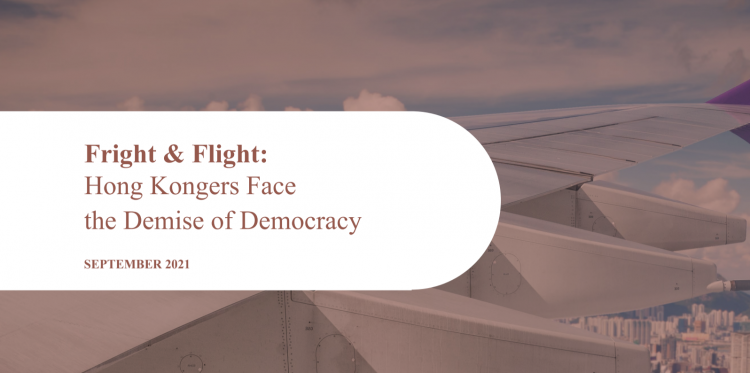Fright & Flight: Hong Kongers Face the Demise of Democracy
Hong Kong society has changed extensively since the 2019 pro-democracy protests which led to the enactment of the July 2020 National Security Law (NSL). The first half of 2021 alone witnessed the mass arrest of individuals for participating in pro-democracy activities; the forced shut down of Apple Daily, a pro-democracy newspaper, through the freezing of its assets and the arrest of its founder, executives and editors; and a reform of its electoral system to vet election candidates and favor pro-Beijing politicians. These changes have reshaped political, legal and social aspects of what it means to live in Hong Kong. However, in July 2021, Hong Kong once again took a step further away from democracy and towards a closed society. The first NSL trial significantly altered Hong Kong court system procedure and the implementation of the NSL. A three-judge panel tried an individual despite the person requesting a jury of peers, as allowed by Hong Kong legal precedent, and the three judge panel determined that the popular pro-democracy slogan “Liberate Hong Kong, Revolution of Our Time” has a “secessionist meaning” and therefore using it is incitement to commit succession under the NSL.
The recent ruling under the NSL and the shutting down of the Apple Daily makes it hard to refute that the Hong Kong government has now criminalized participation in pro-democracy activities and opposition speech, systematically suppressing pro-democracy voices. Under these circumstances participation in speech or sharing opinions that can be viewed as pro-democracy carries a heavy legal risk. Therefore, collecting information on perceptions in Hong Kong of non-democratic reforms and democracy is challenging and dangerous, especially for domestic stakeholders. To address this widening information gap, NDI commissioned an organization to conduct an anonymous online survey of perceptions in Hong Kong on democracy, political engagement, life satisfaction and the future of Hong Kong.
The survey elicited complex findings depicting societal disagreement on how close Hong Kong should be with mainland China and on the value of democracy in Hong Kong. Despite the recent history of intense civic displays of political participation and engagement, the majority of survey respondents indicated no participation in activities such as; taking part in a demonstration, protest or strike; signing a petition; or even voting in an election. There were also societal divides between different age groups and those born in Hong Kong compared to those not born in Hong Kong. Those born in Hong Kong were less confident in Hong Kong institutions, less satisfied with democracy in Hong Kong and more likely to participate in civic actions and want a more distant relationship with mainland China. Similarly, young respondents were more interested in politics, believed more in democracy’s ability to maintain order and valued democracy over economic development. Both those born in Hong Kong and young respondents expressed a desire to leave the city more than other groups.
As the political and legal environment in Hong Kong continues to develop, there are three key findings international and domestic stakeholders should keep in mind from this report:
1. Decreasing Trust in Institutions: The majority of respondents lacked confidence in Hong Kong’s Legislature, Media, Chief Executive, the Hong Kong Special Administrative Government, Business, Courts and Political Parties.
2. Democratic Resilience: Hong Kong youth and those born in Hong Kong support democracy more than other Hong Kongers. They were also more willing to admit to participating in pro-democracy activities.
3. An Endangered Movement: In a stark majority, 75 percent of respondents aged 18 to 24 reported they would or would possibly leave Hong Kong. Those born in Hong Kong were much more likely to express a desire to leave Hong Kong. As these two demographic groups were most likely to express pro-democracy views, this endangers any remnants of the pro-democracy movement in Hong Kong.
